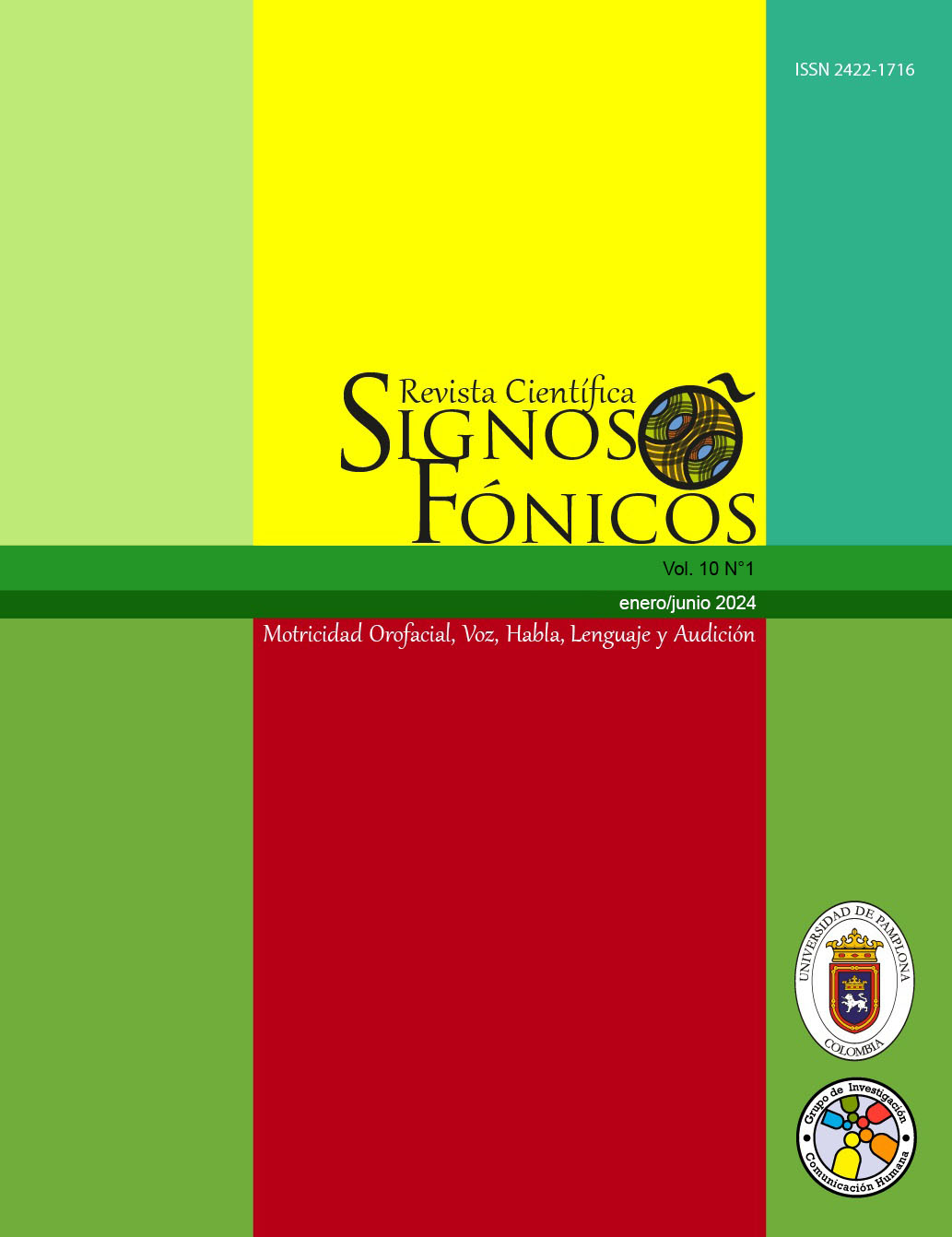Flujo máximo de tos y evaluación de la deglución: Una revisión de literatura
DOI:
https://doi.org/10.24054/rcsf.v10i1.3064Palabras clave:
Tos, Deglución, Trastornos de la deglución, NeumoníaResumen
INTRODUCCION: Objetivo Identificar el uso del flujo máximo de tos en la evaluación de la deglución documentado en publicaciones científicas. Métodos: se efectuó una revisión bibliográfica entre febrero y marzo 2024 en las bases de datos PubMed, SciELO y Cochrane Library.
Se incluyeron publicaciones en español e inglés de los últimos 5 años que reportaran el uso del flujómetro en la evaluación de la deglución. Resultados: Cumplieron con los criterios de inclusión 7 artículos que fueron seleccionados tras la búsqueda bibliográfica. Conclusiones: La medición del flujo máximo de tos es una herramienta simple y efectiva para prevenir la neumonía por aspiración, pero es crucial realizarlo junto con la evaluación de la deglución
Descargas
Referencias
Kimura Y, Takahashi M, Wada F, Hachisuka K. Differences in the Peak Cough Flow among Stroke Patients With and Without Dysphagia. J UOEH. 2013;35(1):9-16.
Trebbia G, Lacombe M, Fermanian C, Falaize L, Lejaille M, Louis A, et al. Cough determinants in patients with neuromuscular disease. Respiratory Physiology & Neurobiology. abril de 2005;146(2-3):291-300.
Padovani AR, Moraes DP, Mangili LD, Andrade CRF de. Protocolo fonoaudiológico de avaliação do risco para disfagia (PARD). Rev soc bras fonoaudiol. septiembre de 2007;12(3):199-205.
Mari F, Matei M, Ceravolo MG, Pisani A, Montesi A, Provinciali L. Predictive value of clinical indices in detecting aspiration in patients with neurological disorders. Journal of Neurology, Neurosurgery & Psychiatry. 1 de octubre de 1997;63(4):456-60.
Miles A, McFarlane M, Scott S, Hunting A. Cough response to aspiration in thin and thick fluids during FEES in hospitalized inpatients: Cough response in thin and thick fluids. International Journal of Language & Communication Disorders. septiembre de 2018;53(5):909-18.
Logemann JA, Veis S, Colangelo L. A Screening Procedure for Oropharyngeal Dysphagia. Dysphagia. enero de 1999;14(1):44-51.
Mir MJ, Hegland KW. A Survey of Speech-Language Pathologists’ Experience With Clinical Cough Assessment. Perspect ASHA SIGs. 17 de diciembre de 2021;6(6):1627-40.
Daniels SK, McAdam CP, Brailey K, Foundas AL. Clinical As
sessment of Swallowing and Prediction of Dysphagia Severity. Am J Speech Lang Pathol. noviembre de 1997;6(4):17-24.
Smith Hammond CA, Goldstein LB, Horner RD, Ying J, Gray L, Gonzalez-Rothi L, et al. Predicting Aspiration in Patients With Ischemic Stroke. Chest. marzo de 2009;135(3):769-77.
Min SW, Oh SH, Kim GC, Sim YJ, Kim DK, Jeong HJ. Clinical Importance of Peak Cough Flow in Dysphagia Evaluation of Patients Diagnosed With Ischemic Stroke. Ann Rehabil Med. 31 de diciembre de 2018;42(6):798-803.
Fernández-Carmona A, Olivencia-Peña L, Yuste-Ossorio ME, Peñas-Maldonado L. Tos ineficaz y técnicas mecánicas de aclaramiento mucociliar. Medicina Intensiva. enero de 2018;42(1):50-9.
Bianchi C, Baiardi P, Khirani S, Cantarella G. Cough Peak Flow as a Predictor of Pulmonary Morbidity in Patients with Dysphagia. American Journal of Physical Medicine & Rehabilitation. septiembre de 2012;91(9):783-8.
Sepúlveda M R. El flujómetro de Wright: Una herramienta indispensable en la práctica ambulatoria. Rev chil enferm respir [Internet]. abril de 2004 [citado 22 de diciembre de 2022];20(2). Disponible en: http://www.scielo.cl/scielo.php?script=sci_arttext&pid=S0717-73482004000200004&lng=en&nrm=iso&tlng=en
Kashima K, Watanabe K, Sato T, Katori Y. Analysis of Dysphagia and Cough Strength in Patients with Unilateral Vocal Fold Paralysis. Dysphagia. abril de 2023;38(2):510-6.
Lee KW, Kim SB, Lee JH, Kim SW. Cut-Off Value of Voluntary Peak Cough Flow in Patients with Parkinson’s Disease and Its Association with Severe Dysphagia: A Retrospective Pilot Study. Medicina. 11 de mayo de 2023;59(5):921.
Choi J, Baek S, Kim G, Park H won. Peak Voluntary Cough Flow and Oropharyngeal Dysphagia as Risk Factors for Pneumonia. Ann Rehabil Med. 31 de diciembre de 2021;45(6):431-9.
Lee SJ, Huh S, Ko SH, Min JH, Ko HY. Utilizing Pulmonary Function Parameters to Predict Dysphagia in Individuals With Cervical Spinal Cord Injuries. Ann Rehabil Med. 31 de diciembre de 2021;45(6):450-8.
Han YJ, Lee J, Sohn DG, Park GY, Kim Y, Park HY, et al. Cut-off Values of the Respiratory Muscle Power and Peak Cough Flow in Post-Stroke Dysphagia. Medicina. 24 de noviembre de 2020;56(12):635.
Sakai Y, Ohira M, Yokokawa Y. Cough Strength Is an Indicator of Aspiration Risk When Restarting Food Intake in Elderly Subjects With Community-Acquired Pneumonia. Respir Care. febrero de 2020;65(2):169-76.
Choi JB, Jung YJ, Park JS. Comparison of 2 types of therapeutic exercise: jaw opening exercise and head lift exercise for dysphagic stroke: A pilot study. Medicine. 18 de septiembre de 2020;99(38):e22136.
Pikus L, Levine MS, Yang YX, Rubesin SE, Katzka DA, Laufer I, et al. Videofluoroscopic Studies of Swallowing Dysfunction and the Relative Risk of Pneumonia. American Journal of Roentgenology. junio de 2003;180(6):1613-6.
Yamakawa, R., Yokoyama, H., Watanabe, Y., Yokoyama, Y., Takeichi, N., Ihizaka, S., Okada, K., & Sasa, M. The Level of Cough Peak Flow for Judging Ability of Clear Airway Secretion in Middle-Old Age Subjects. Jinkoukokyu. 2010;(27):82-88.
Descargas
Publicado
Número
Sección
Licencia
Derechos de autor 2024 Amalia Nanjarí R , María del Carmen Campos

Esta obra está bajo una licencia internacional Creative Commons Atribución-NoComercial-SinDerivadas 4.0.











